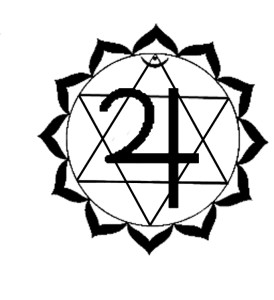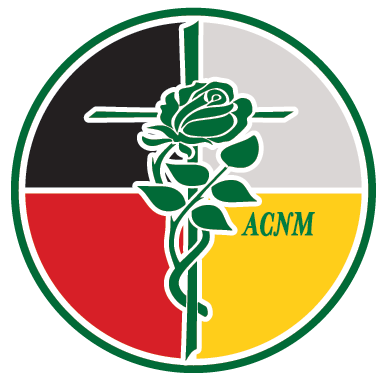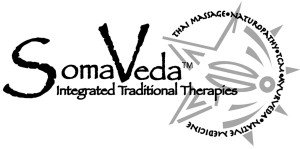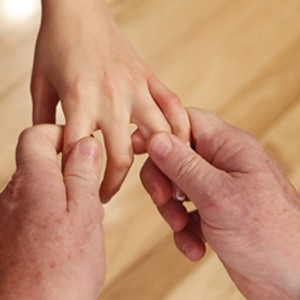Carpal Tunnel Syndrome and Repetitive Stress Injury, The SomaVeda® Thai Yoga Solution
Part 2 of 2. by Anthony B. James DNM(C), ND, MD(AM), DOM(C), DPHC(h.c.), PhD, RAC, SMOKH
INNER: Any particular disorder or trauma whether acute or chronic like CTS will manifest differently in different persons. When looking for the INNER significance we first consider the balance and activity of the Chakras. We gain insight into the specific chakras involved by observing the physical correlations, i.e., corresponding body part, orifice, closest Sen, or line, and/or meridian.
 The chakras most closely associated with the hands and wrist are fourth Chakra, ANAHATA , commonly called the Heart Chakra. The hands are the vehicle for expressing and communicating from and of the heart. We say that the skin of the hands and arms is the organ most closely associated with the heart.
The chakras most closely associated with the hands and wrist are fourth Chakra, ANAHATA , commonly called the Heart Chakra. The hands are the vehicle for expressing and communicating from and of the heart. We say that the skin of the hands and arms is the organ most closely associated with the heart.
The bones and sinew of the hands are ruled or controlled by the first Chakra or root Chakra. The quality of the energy here is one of security and survival. That these two such disparate qualities of expression of energy should overlap here may explain many things. For example, the ability of the hands to express the most tender and compassionate intent are the very same hands that can create willful injury and harm.
The highest use of the hands is found in the expression of the positively aspected fourth Chakra. This is demonstrated in the quintessence of the loving touch where the hands are expressing the inner light and warmth of the heart according to its clear, compassionate and loving nature. When the hands are used purely as tools for procuring security and survival needs we run into difficulty. Because of their structural support in first Chakra, hands can be used in this fashion for short periods of time. However, long term use in this manner results in abuse from overuse.
For contrast, look at the feet which have a lower Chakra value and suffer little from repetitive exertion like walking.
You might think to ask “Why do well meaning and good hearted therapists breakdown and develop CTS?” Consideration of the Chakras gives us various answers according to individual nature. For instance, if one is working for the sake of income, simply doing healing work to produce income guarantees no umbrella of longevity. Unless the livelihood you are functioning within has inner support energetically, you might as well be breaking rocks with a hammer for a living. There could be unresolved issues of the heart, and using your hands in a healing way will cause each and every one of these issues to surface over time. The pain in your hands may be a surrogate for pain in your own heart crying for attention and ultimate resolution. Rather than seeing this and reacting appropriately, you may have shut them out or seen the issues and the pain as somehow not related. If you force your hands by act of will to work through the pain, you refuse to confront the message of the heart Chakra and it begins to shut down, reducing pranic energy to the hands and creating an opportunity for breakdown.
Strength or weakness in the hands is also related to issues of control. Pushing, clutching and grasping are examples of this. The tighter you attempt to hold on to your illusions the weaker you ultimately become.
The fourth Chakra is the moving Chakra reconciling celestial and terrestrial influences. The energy flows most easily through the secondary Chakras or wind gates in the palms of the hands when we are clear, relaxed and openly expressing the heart with a soft and open hand.
An imbalance in any Chakra is reflected to a degree as an imbalance in all of the Chakras. For this reason I recommend a general balancing or series of general balancing sessions. Energetically, every part of us is connected to every other part of us and in theory, no imbalance of any kind can persist without the support and cooperation of all of the other parts of us. The “us” I refer to is a community of individual consciousnesses that act synergistically and sympathetically in harmony with one another. The communication within and between the various constituents that make us up is instantaneous. Many times a part of us that is out of sync energetically with the whole is brought back to balance by positively affecting the community that nurtures and supports it. We call this Distal Theory. In Distal theory we work on and balance the farthest point of the energetic body that you can relate to the specific problem. Theories of reflexology also derive from this principle.
As we read the kinds of emotional issues associated with imbalance in the heart Chakra, we can see plenty of opportunity for negative emotions! Any and all negative emotions relating to the issues around this condition need to be directly addressed. Our preferred method is called “Bio-Tapping” and/ or EFT (Emotional Freedom Technique). The idea is to go directly to the source of the negative emotions and handle it, dissipating the negative association and the other factors that contribute to the disorder as hindrances to full recovery. As we look at the role of negative emotions we also have to consider just how pivotal or important they are as causative factors in apparently physical disorders such as CTS or in the generation and susceptibility for degenerative disorders.
For example, I once had a client who came into the office medically diagnosed and disabled with severe CTS. She had been unable to work for more than two full years and had severe degeneration in her right wrist, arm and shoulder. She could not work, play or sleep due to the pain and restriction of her disability.
When we started working, I noticed that in addition to her apparent symptoms which were quite obvious (the swelling, the atrophy, the limits on her range of motion etc.) that she also was quite sad, depressed and even fatalistic, thinking that there was no hope and that eventually she would become completely disabled.
I started talking to her about this fatalism. I soon realized that her story was very emotional and that she had actually had a long history of having weakness in her right arm and also had a history of injuring it. Just discussing the history of her arm in life became very upsetting for her! I asked her how she was feeling and she said at first very sad then depressed. I then coached her on a tapping session for the negative emotions of sadness and depression. She seemed to get some relief however, kept saying there was more, something she could not quite seem to get a hold of.
I asked her when the first time was that she remembered having an issue or pain in her arm. While I asked the question I was holding her affected wrist. She suddenly blurted out “Oh my God!” and snatched her hand away. Looking at me with big eyes she started saying “Oh no.” I asked her what she meant, what had she remembered and she told me a story. Her story of this first memory was that as a little girl she had been visiting Grandpa’s house. She was only six or seven years of age at this time. While the adults were sitting in the kitchen playing some Pinochle, a card game, she was playing by herself in the living room. She accidentally knocked over some porcelain tchochke (chachkee) that fell to the floor and broke into pieces.
This startled her and immediately the adults rushed into the room to see what was the matter. Upon seeing her and the broken statue an uncle stepped over to her, grabbed her hand and started yelling and violently shaking her, all the while saying things like “You stupid girl!” “You’ve broken this and it can never be replaced,” and “You’re worthless.” Even more disturbing, he shook her so hard that he completely separated her shoulder causing a severe dislocation injury. She had to be taken to the hospital while the whole family was still berating her for her stupidity. It turns out that Grandma had passed recently and the family was still in mourning and remorse and the breaking of the statue that had been a cherished possession of hers was the critical event triggering the expression of their grief and emotions.
The story showed how the negative emotions first displayed and passed painfully to her by her family members caused an energetic distortion in her body’s energy field, especially relating to her wrist, arm, and shoulder and became a source of both continued emotional issues of self-worth but also their corresponding physical expression or symptom as a chronic weakness in that arm.
We Bio-Tapped all of the issues that we could name relating to the incident and she immediately began to experience relief.
I continued the rest of the indicated protocol and within ten days of treatments she was symptom free! Her being symptom free was confirmed by three different doctors and acknowledged as an amazing recovery.
OUTER: 1) Do the most exhaustive general series of one to seven sessions either SomaVeda® Thai Yoga Southern , Northern, or Conjunctive/ Eclectic including a generic balancing for the fourth Chakra and or Sen Kalathari. For an apprentice or student, I recommend a Level One general session. For more advanced practitioners a series of at least seven individual sessions (the Therapeutic Day concept). This is suggested because CTS is usually a chronic disorder developed gradually over a period of time.
(SEN: The specific Thai Yoga Sen , or Prana Nadi closely associated or indicated in this disorder is Sen Kalathari. Sen Kalarthari is the X-like Prana Nadi or channel which begins at the navel and has two principle channels which essentially follows the pattern of the skeleton. Sen Kalathari is part of the primary distribution network for Prana in the body. After having done a thorough general session, more advanced practitioners may continue with a generic balancing session for Sen Kalathari. )
It will take a little time for the average person to assimilate their healing. We must take the necessary time to address the entire community of the body/mind/spirit continuum. This approach is generally stimulating to the entire organism and will bolster latent healing capacity as well as reduce feelings of trauma.
The strategy is to palm press, thumb press, facilitate posture/range of motion in all related segments. Release key points and Wind Gates according to proximity (Use Shavayatra points or Lom ( Wind Gates ) if you know them. They are listed in “Lines, Wheels and Points” by this author.) Use walking or deep compression with the appropriate tool (i.e. feet, elbow, knee or palm) and finish with light palming. Open, release and facilitate the energy and circulation through the whole affected area, especially any lines or meridians running through or immediately adjacent to the affected area. Be sure to include any obvious areas referring pain or where pain appears to originate.
Regarding your use of pressure, work light in the beginning to enhance your palpation evaluation and tactile sensitivity. At the same time, this light work is relaxing and soothing to your client. Next, work as deeply as you can within the tolerance of your client without making things worse. Remember: “At the very least do no harm”. Finish with light soothing work at the end of every therapeutic encounter.
2) Specific Protocol: Begin with Puja as always. Remember to warm up gradually. Give the body time to acclimate to what is coming! Palm press the entire arm from shoulder to the fingers. Hold the first point (Lom) at the shoulder for at least a twenty count.
List:
1) General Session to form foundation of treatment.
2) Bio-Tapp for any apparent energy disruptions and or negative emotions.
3) Sen Kalathari Generic Protocol
4) Specific Protocol : Tailored to specific needs of actual individual client.
A) PP arm & hand, hold Primary Shoulder Point
B) PP & TW or TP, Anterior Medial Arm
C) PP & TW or TP, Anterior Lateral Arm
D) Reflexology of the Hand (anterior and posterior lines and points)
E) Passive Range of Motion on the Wrist (include gentle traction)
F) Pulling the Fingers
G) Stretch the Fingers
H) Supine Posterior Upper Arm
I) Walking on the Shoulder then the Arm, Medial and Lateral
J) PP Arm, Finish
(PP= Palm Press, TW= Thumb Walk, TP= Thumb Press) (For more specific instructions with illustrations see the books, “Nuat Thai, Traditional Thai Medical Massage” pgs. 43-46, and “Nuat Thai the Northern Style” pgs. 78-84 by this author.)
3) Nutrition and Diet: Nutrition is the single biggest factor within the control and direction of the client in any persistent or chronic illness no matter what. It is especially helpful in any chronic condition with an inflammatory or degenerative aspect. Specific nutritional recommendations vary so widely from one person to the next that it is beyond the scope of this article to try to handle it. I will however, give a few general pointers for virtually every client. Think “Toxicity vs. Deficiency.” Remove as many and as much toxins from the diet as possible, like additives, artificial sweeteners, food colorings, genetically modified (GM) foods or additives, chemicals etc. Eat the freshest, locally grown, organic foods (i.e. vegetables, grains and fruits) in the greatest variety with the least preparation, cooking or adulteration feasible. Also a good rule is no more than 5% to 95% meat, meat products and animal derived byproducts. Drink adequate and clean water.
4) Adjunct Therapy and Applications: In SomaVeda® Thai Yoga we also use and recommend any natural, non-invasive, safe, alternative tool with low or no adverse side effects which can support the healing process. Specifically for CTS the use of light based natural therapy such as far-infrared, MF-TDP heat lamps and Hot Herbal Compress (Nuat Prakhop Samun Praii), Aroma therapy with essential oils and infusion soaks etc. Modern Ayurveda incorporates Homeopathic remedies for both primary symptoms and for the stress associated with this chronic condition. We may also use more specific Thai Acupressure techniques and Acupuncture with needles and/or via electro-stimulation.
Please note: No therapy here is specifically recommended unless recommended by a licensed and or legal professional and provided by a competent and or trained and certified practitioner. You would need to verify your right to practice legally any or all of the recommendations in this article in your state of residence. No information in this article is meant as a substitute for competent and legal medical advise.
SECRET: In a way the Secret is the simplest and most direct part of the whole equation. The Secret is acknowledged in the Puja or Prayer. Every true Thai style session protocol begins and ends with some form of Puja. This Puja might be as simple as a repetition of the OM NAMO mantra or may follow a more elaborate format. We acknowledge the fundamental and common origin of all pain and suffering. Lack of understanding comes from a lack of understanding of the true nature of this world and the self within it.
We pray or create an affirmation for the enlightenment and the perfect realization of the Four Boundless Divine States of Mind, Promiiwihan Sii, Boundless Love, Boundless Compassion, Boundless Joy, and Boundless Equanimity. We petition for this for our client now. In SomaVeda™ we teach that Puja is a five part process where we acknowledge and encourage the innate and perfect inner wisdom healer that lives within each and every one of us to take charge and to bring happiness and wellness to our client and ourselves. We ask permission of this inner healer to show us the proper course of treatment and if we listen it will tell us as after all, it is the “Master,” the “spirit” of Shivago within each of us.
It is possible to receive this light in the self in less time than it takes to snap the fingers. This brings wealth of the spirit and hope into the equation. Where these qualities truly exist, pain and suffering cannot persist.
The SomaVeda® Thai Yoga outline or basic protocol described in this article is basically the same for many illnesses and imbalances.
For more information on educational materials by this author see the bookstore at ( BeardedMedia.Com ) If you think your friends would benefit from this information please have them subscribe to our newsletter!
For information on SomaVeda Thai Yoga Practitioner Certification Program Click Here!
Disclaimer:
All Information is provided for educational purposes only and not intended to be used for any therapeutic purpose, neither is it intended to diagnose, prevent, treat or cure any disease. Please consult a health care professional for diagnosis and treatment of medical conditions. While all attempts have been made to ensure the accuracy of this information. The author and ThaiMassage.Com does not accept any responsibility for any errors or omissions.
Copyright© 2015, Anthony B. James All rights reserved under International and Pan American copyright conventions. World rights reserved. No part of this book may be reproduced or utilized in any form or by any means, electronic or mechanical, including photocopying and recording, or by any information storage and retrieval system, without permission in writing from the publisher. Inquires should be addressed to: Anthony B. James, 5401 Saving Grace Ln, Brooksville, FL 34602 · ThaiYogaCenter.Com



One thought on “Carpal Tunnel Syndrome Part Two”